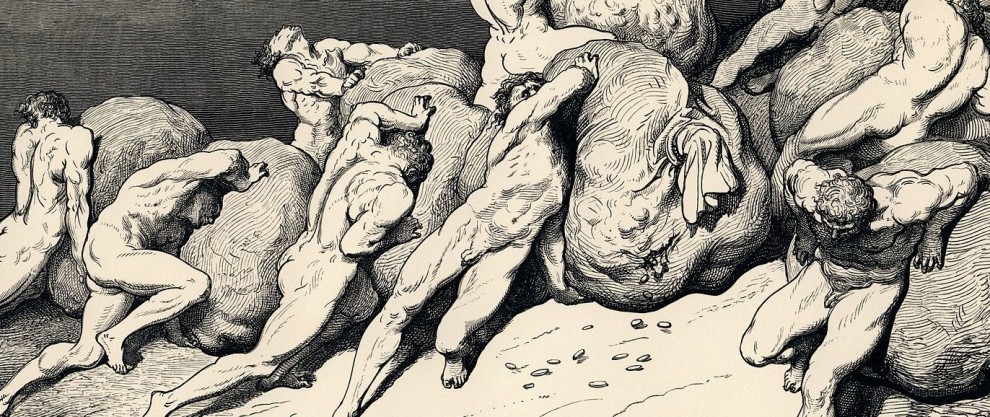Among the host of ways Virgil modifies and develops Homer’s Iliad and Odyssey, the changes wrought to the underworld are arguably the most substantial. A complex geography forms of punishment, rivers, the abyss and the “places of delight” fills what was a much simpler and more monotonous landscape in Homer. Beyond the setting, Virgil explores his underworld in conjunction with a cosmology fed by “Spirit and a Mind infused through all the members of the world,” which in turn funds a view of reincarnation of souls oriented toward the future greatness of Rome.
In short, in Virgil the underworld becomes a pivotal element not only of the plot, but of cosmology and history.
One of the most fascinating ways Virgil develops the underworld is to link it to theology, and the promises of the gods. Throughout Homer’s works, Zeus “nods his head,” signifying that his will has in some sense been ratified. For instance, we read in the Iliad that “He spoke, the son of Kronos, and nodded his head with the dark brows, and the immortally anointed hair of the god swept from his divine head, and all Olympos was shaken” (I.528). Zeus himself explains the nodding of his head: “See then, I will bend my head that you may believe me. For this among the immortal gods is the mightiest witness I can give, and nothing I do shall be vain nor revocable nor a thing unfulfilled when I bend my head in assent to it” (I.524).
Expanding on this material, Virgil notes that the gods nod their heads by the power of hell: “Cocytus is the deep pool that you see, the swamp of Styx beyond, the infernal power by which the gods take oath and fear to break it” (VI.436). Elsewhere he writes: “So ran the pledge of Jove, ratified when by his Stygian brother’s rivers, boiling banks, and black whirlpool he took oath nodding, making all Olympus tremble at his nod” (IX.146; cf. X. 158, XII. 1108).
Virgil, developing the underworld as en essential element of his cosmology, eschatology and theology, has taken the Homeric “head nodding” and ensuing shaking of heaven, and explained it by binding it to the underworld, “the ghastly realm the gods hate” (VIII. 324). When Virgil’s gods swear or take an oath, they do so by the power of that which they hate and fear: the underworld.
But this raises an interesting question: what does it mean for the God of Abraham, Isaac and Jacob to “nod his head,” to make promises and covenants? Is there anything to Virgil’s suggestion? Does God promise on the basis of that which he hates?
That might be a stretch, but less than one might think. As Jeremy Treat points out in his forthcoming book, there is significant scholarly agreement that when God passes between the cleaved animals in Genesis 15, he declares the same fate for himself (i.e. death) should he fail to carry out his promise or responsibility (Crucified King, 62; citing Paul Williamson, Sealed with an Oath, 86).
Both in Virgil and the Old Testament, therefore, there is reason to believe that the underworld plays a significant role not only in terms of our understanding of the afterlife, but in theology itself—our understanding of the meaning and significance of acts of promising or covenanting on the part of God.
What should we make of this line of thought? Christian theology is irreducibly covenantal in shape. From Noah and the establishment of Israel up through the Lord’s supper and marriage rites, the covenants of God and those into which we enter are essential elements of the Christian faith.
But what is the power of a covenant? In part, Virgil suggests, it is a full and radical binding on the part of the one covenanting to ensure the promise is fulfilled, a binding so complete as to bind oneself to the power of hell, to death, suffering and dissolution, should one fail to keep this covenant. This, we might say, is one part of a full understanding of the extent to which God in Christ binds himself to us in his covenants with us, and in fact informs the backdrop for Christ’s fulfillment of the covenant through his death, descent into hell, and resurrection.
It is precisely through encountering the power by which God covenants, suffering the reality of hell, that God brings us to the fulfillment of that same covenant: life in fellowship with him.
